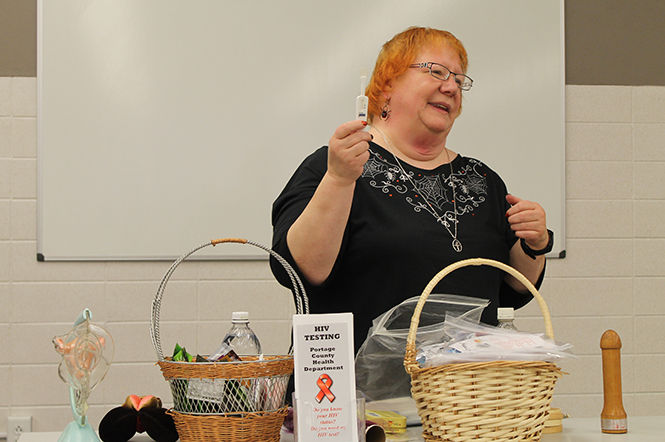The ins and outs of latex
Kat Holtz, health educator and HIV specialist, teaches Kent State students about contraceptives and practicing safe sex at the “latexology” presentation as a part of Sex Week on Monday, Oct. 27, 2014.
October 27, 2014
Kat Holtz, health educator and HIV specialist, coaxed students to play penis ring toss Monday night. After no one succeeded, she broke the awkward silence by saying, “None of you are actually coordinated enough to have sex.”
Holtz focused on the proper way to use contraceptives and how to have safe sex during her “latexology” presentation that kicked off Kent Interhall Council’s annual Sex Week.
This year, with the theme of “Let’s Get Sweaty,” Sex Week offers students events to learn more about sex and relationships. Some events include the 3rd annual Condom Couture Tuesday at 7 p.m. in Bowman Hall and the Sextoberfest on Friday from 4 to 6 p.m. in the Multipurpose Gym of the Student Recreation and Wellness Center.
The three things that are 100 percent safe, when it comes to sex education, are abstinence, masturbation and monogamy. But Holtz touched on the fact that male condoms are the most common form of protection during sex.
“You would be surprised at the amount of people who don’t know how to use condoms properly,” Holtz said.
Only two students in the audience had ever read the directions for a condom.
Condoms can be made out of latex, animal skin or polypropylene.
“You know how many condoms you get out of a sheep? One,” Holtz said. “There’s only one part of the intestine that’s used to make a condom.
“Obviously if you’re a vegetarian you’re not going to want to use a lambskin condom, that would just be wrong,” Holtz joked.
Condoms should not be placed in cars, wallets, back pockets, in the sunlight or under florescent lights for too long.
“Keep them away from any heat, any freezing, any friction or pressure,” Holtz said. “Don’t put them anywhere that they could potentially be punctured.”
Holtz, who works at the Portage County Health Department in Ravenna, helps raise awareness about the spread of HIV and provides sessions for free HIV testing. During her presentation, she demonstrated the different ways that people can be tested for STDs and STIs.
“You cannot get tested for every sexually transmitted disease that’s out there, but you can get tested for the common ones,” Holtz said. “Some of them you’re not going to know until you show actual symptoms.”
Some of the more common sexually transmitted diseases are herpes, HIV, HPV, chlamydia and gonorrhea.
Holtz said she believes that some students may come into college not knowing about sex education.
“We’re an abstinence-only state so they haven’t talked about comprehensive sexuality education for quite some time,” she said. “A school that does, risks losing a lot of funding.
“When they don’t have that education to fall back on for how to be safe, they end up in very risky situations and end up with a pregnancy or an STD before they realize what they should have done,” Holtz said.
Students said the “latexology” presentation broadened their knowledge on sex education.
“I didn’t know the female condom could be in for eight hours,” said Stephanie Zurcher, a junior communication studies major. “I thought that was pretty cool.”
Members of the KIC e-board talked about why they thought this was a good starting event for Sex Week.
“I think the importance of it is just for people to know that you can talk openly about sex,” said Dallas Trescher, a member of the e-board on KIC Sex Week committee.
“A lot of people, especially older generations like our presenter, don’t like to talk to kids our age about sex because they don’t want us to do it,” she said. “The good thing about her is she knows you’re going to have it so she wants you to be as safe as possible with it.”
Contact Carolyn Pippin at [email protected].












